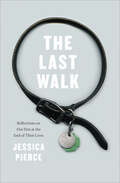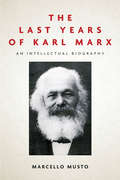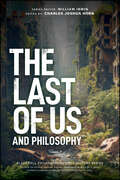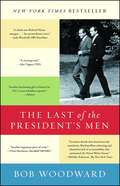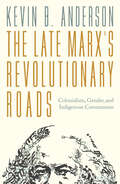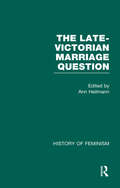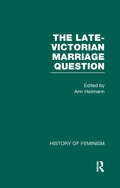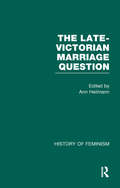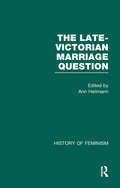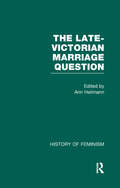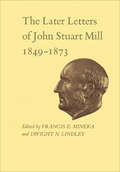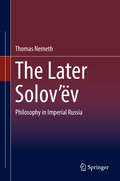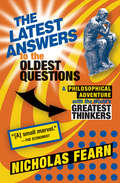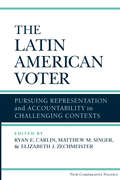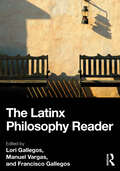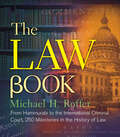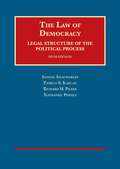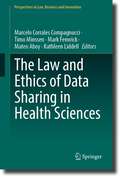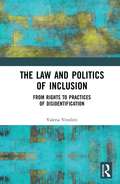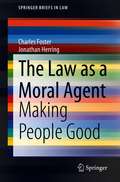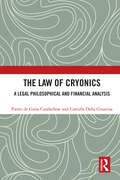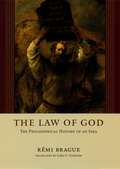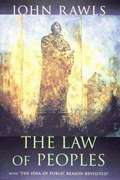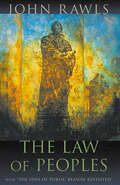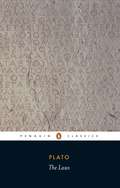- Table View
- List View
The Last Walk: Reflections on Our Pets at the End of Their Lives
by Jessica Pierce&“Should be required reading for every pet owner. Readers will identify with Pierce&’s feelings of ambivalence…as they read about Ody&’s antics and challenges.&”—Library Journal Watching our beloved animals grow older is never easy. This book, by a bioethicist who recounts the moving story of her dog Ody&’s final year, also presents an in-depth exploration of the practical, medical, and moral issues that pet owners confront with the decline of their companion animals. Combining heart-wrenching personal stories, interviews, and scientific research to consider a wide range of questions about animal aging, end-of-life care, and death, Jessica Pierce tackles such vexing questions as whether animals are aware of death, whether they're feeling pain, and if and when euthanasia is appropriate. Given what we know and can learn, how should we best honor the lives of our pets, both while they live and after they have left us? The product of a lifetime of loving pets, studying philosophy, and collaborating with scientists at the forefront of the study of animal behavior and cognition, The Last Walk asks—and answers—the toughest questions pet owners face. &“Using her experience caring for her elderly Vizsla as a springboard, Pierce, who is a bioethicist, explores the evolution of North American attitudes toward pets and their demise, while delving as deeply as she can into her own feelings as her dog Ody goes into decline.&”—Globe and Mail &“With her beautiful &‘Ody's journal&’ passages, Jessica Pierce made me feel close to her beloved and high-maintenance old dog. It was through Ody&’s challenges, and Pierce's on his behalf, that I came to grapple in important new ways with issues of pet aging and death. This book is revolutionary, and I loved it with all my heart.&”—Barbara J. King, author of Being with Animals
The Last Years of Karl Marx: An Intellectual Biography
by Marcello MustoAn innovative reassessment of the last writings and final years of Karl Marx. In the last years of his life, Karl Marx expanded his research in new directions—studying recent anthropological discoveries, analyzing communal forms of ownership in precapitalist societies, supporting the populist movement in Russia, and expressing critiques of colonial oppression in India, Ireland, Algeria, and Egypt. Between 1881 and 1883, he also traveled beyond Europe for the first and only time. Focusing on these last years of Marx's life, this book dispels two key misrepresentations of his work: that Marx ceased to write late in life, and that he was a Eurocentric and economic thinker fixated on class conflict alone. With The Last Years of Karl Marx, Marcello Musto claims a renewed relevance for the late work of Marx, highlighting unpublished or previously neglected writings, many of which remain unavailable in English. Readers are invited to reconsider Marx's critique of European colonialism, his ideas on non-Western societies, and his theories on the possibility of revolution in noncapitalist countries. From Marx's late manuscripts, notebooks, and letters emerge an author markedly different from the one represented by many of his contemporary critics and followers alike. As Marx currently experiences a significant rediscovery, this volume fills a gap in the popularly accepted biography and suggests an innovative reassessment of some of his key concepts.
The Last of Us and Philosophy: Look for the Light (The Blackwell Philosophy and Pop Culture Series)
by William IrwinDid Joel do the right thing when he saved Ellie? Are those infected by the Cordyceps conscious? Are communities necessary for human survival and flourishing? Should Ellie forgive Joel? Is Abby’s revenge morally justified? Is Ellie’s? The Last of Us franchise includes two of the best video games ever created and the critically acclaimed HBO series. Renowned for brilliant gameplay and world-class narrative, The Last of Us raises timeless and enduring philosophical questions. Beautiful, thrilling, and tragic, Ellie’s story of survival is as philosophical as it is profound. The Last of Us and Philosophy brings together an international team of philosophical experts and fans exploring the timeless questions raised by the video games and the show. Drawing insights ranging from Aristotle and Abby to Buddha and Bill, this book elucidates the roles that trust, community, love, justice, and hope play in The Last of Us. Twenty-four original essays cover both The Last of Us Part I and II and the HBO series, offering accessible and nuanced philosophical analysis of Naughty Dog’s amazing world. Whether you’re a fan of the video games or of the HBO series, The Last of Us and Philosophy will take you on a philosophical journey where you look for the light.
The Last of the President's Men
by Bob WoodwardBob Woodward exposes one of the final pieces of the Richard Nixon puzzle in his new book The Last of the President’s Men. Woodward reveals the untold story of Alexander Butterfield, the Nixon aide who disclosed the secret White House taping system that changed history and led to Nixon’s resignation. In forty-six hours of interviews with Butterfield, supported by thousands of documents, many of them original and not in the presidential archives and libraries, Woodward has uncovered new dimensions of Nixon’s secrets, obsessions and deceptions. The Last of the President’s Men could not be more timely and relevant as voters question how much do we know about those who are now seeking the presidency in 2016—what really drives them, how do they really make decisions, who do they surround themselves with, and what are their true political and personal values?
The Late Marxs Revolutionary Roads: Colonialism, Gender, and Indigenous Communism
by Kevin B. AndersonThe author of the acclaimed Marx at the Margins analyses the late Marx on Indigenous communism, gender, and anti-colonialism.In his late writings, Marx went beyond the boundaries of capital and class in the Western European and North American contexts. Kevin Anderson carries out a systematic analysis of Marx&’s Ethnological Notebooks and related texts on Russia, India, Ireland, Algeria, Latin America, and ancient Rome. These texts, some of them only now being published, provide evidence for a change of perspective, away from Eurocentric worldviews or unilinear theories of development. As Anderson shows, the late Marx elaborated a truly global, multilinear theory of modern society and its revolutionary possibilities.
The Late-Victorian Marriage Question: A Collection of Key New Woman Texts V1
by Ann HeilmannFirst published in 2004. This five volume set collects together a series of writings on the role of women in the late-Victorian Era. Volume 1 includes texts on the concept of the 'New Woman', a social phenomenon around 1894, a woman with a college education, professional aspirations and feminist convictions.
The Late-Victorian Marriage Question: A Collection of Key New Woman Texts V2
by Ann HeilmannFirst published in 2004. This five volume set collects together a series of writings on the role of women in the late-Victorian Era. Volume 2 places the controversy on marriage and motherhood in the context of the New Woman debate. While the three debates were linked, each had its own dynamic and saw shifting alliances and antagonisms. The marriage debate pitted the three different groups and their opposing interests against each other: the Old (traditionalist) Woman defended the ideals of marriage, while the progressive man advocated 'free Iove', and the New Woman emphasized female independence within and outside marriage.
The Late-Victorian Marriage Question: A Collection of Key New Woman Texts V3
by Ann HeilmannFirst published in 2004. This five volume set collects together a series of writings on the role of women in the late-Victorian Era. New Woman fiction left its mark on fin-de-siecle British culture, transforming the literary landscape well beyond the turn of the century; it also had a considerable impact on the formation of popular as well as political thought. The next two volumes (3 and 4) make available a selection of narrative texts which were widely debated at the time.
The Late-Victorian Marriage Question: A Collection of Key New Woman Texts V4
by Ann HeilmannFirst published in 2004. This five volume set collects together a series of writings on the role of women in the late-Victorian Era. New Woman fiction left its mark on fin-de-siecle British culture, transforming the literary landscape well beyond the turn of the century; it also had a considerable impact on the formation of popular as well as political thought. The next two volumes (3 and 4) make available a selection of narrative texts which were widely debated at the time.
The Late-Victorian Marriage Question: A Collection of Key New Woman Texts V5
by Ann HeilmannFirst published in 2004. This five volume set collects together a series of writings on the role of women in the late-Victorian Era. This final volume of the set, brings together the voices of female New Woman writers and late Victorian literary criticism. The contemporary debate on New Woman fiction formed part of a wider discourse on decadence, degeneration and the crises of gender and sexuality in culture, literature and political life.
The Later Letters of John Stuart Mill 1849-1873: Volumes XIV-XVII
by John Stuart Mill Dwight Lindley Francis MinekaThe Earlier Letters of John Stuart Mill, published in two volumes in 1963, were well received by critics and scholars alike. The publication of these four volumes of later letters completes this edition of Mill's personal correspondence. These volumes contain over 1,800 letters, most never before published, and some sixty earlier letters that have come to light since the publication of the first two volumes of correspondence. The letters have been assembled from widely dispersed collections in the libraries of fifty-eight institutions and of some thirty private collections in Britain and in other countries of the Commonwealth, Europe, and North America. In addition, many personal letters of which no originals survived have been located in contemporary periodicals or biographies of Mill's correspondence.
The Later Solov’ëv: Philosophy in Imperial Russia
by Thomas NemethThis volume offers a critical examination of the later philosophical views of Vladimir Solov’ëv, arguably Russia’s most famous and most systematic philosopher. It offers a philosophically informed approach to this pivotal figure and to his era. Inside, readers will discover a detailed portrait of the often overlooked evolution of the philosopher’s views during the final two decades of his life. The author explores Solov’ëv’s still evolving aesthetic philosophy and his entry into the lively Russian discussion of free will. The work then turns to the philosopher’s mature statements on many figures from within the history of philosophy. This includes Kant and Hegel. Next, readers will learn about his disagreements with several contemporaries as well as contemporaneous movements. These include positivism and materialism. In addition, the coverage includes an elucidation and examination of Solov’ëv’s final expression of his ethical philosophy as set forth in his major ethical treatise Justification of the Moral Good.The overall picture that emerges is of a much more vibrant and heated philosophical community than typically portrayed in Western secondary literature. The book ends with a reflection on the rise of Solov’ëv as a religious mystic at the expense of a critical evaluation of his thought.
The Latest Answers to the Oldest Questions: A Philosophical Adventure with the World's Greatest Thinkers (Books That Changed the World)
by Nicholas Fearn“A serious yet readable overview of philosophy in modern times” from the author of Zeno and the Tortoise: How to Think Like a Philosopher (The Spectator).The work of the classic philosophers is well known. But what do contemporary thinkers say about what it is to be a human being? In his serious, challenging, and remarkably accessible new book, Nicholas Fearn turns to contemporary philosophers to ask the age-old questions: Who am I? What do I know? What should I do? In his search for higher meaning, Fearn consults with thinkers from around the world (including John Searle, Martha Nussbaum, Peter Singer, Richard Rorty, Daniel Dennett, Noam Chomsky, Derek Parfit, Nick Bostrom, among many others) to create an impressive survey of recent thought. Variously, they believe that free will, identity, and consciousness are not what they seem; that the difference between virtue and wickedness can be a matter of sheer luck; and that, one day, we will all be vegetarians. Fearn discovers that the topics haven’t changed, though our world has. Or has it? Moving deftly from pop culture to the writings of Plato, The Latest Answers to the Oldest Questions is a brilliant and entertaining guide to the current state of philosophical thought.“[A] small marvel.”—The Economist“The writing is informative, witty and illustrated by vivid anecdotes.”—The Times Literary Supplement “A readable, challenging guide to the frontiers of thinking.”—The Independent“A commendable summation of current thought and a good mental workout.” —Leeds Guide (UK)“Illuminating, profound and witty. Read it and be challenged to think differently about who and what you are.”—Raymond Tallis, author of Aping Mankind
The Latin American Voter: Pursuing Representation And Accountability In Challenging Contexts
by Ryan E. Carlin Matthew M. Singer Elizabeth J. ZechmeisterIn this volume, experts on Latin American public opinion and political behavior employ region-wide public opinion studies, elite surveys, experiments, and advanced statistical methods to reach several key conclusions about voting behavior in the region's emerging democracies. In Latin America, to varying degrees the average voter grounds his or her decision in factors identified in classic models of voter choice. Individuals are motivated to go to the polls and select elected officials on the basis of class, religion, gender, ethnicity and other demographic factors; substantive political connections including partisanship, left-right stances, and policy preferences; and politician performance in areas like the economy, corruption, and crime. Yet evidence from Latin America shows that the determinants of voter choice cannot be properly understood without reference to context--the substance (specific cleavages, campaigns, performance) and the structure (fragmentation and polarization) that characterize the political environment. Voting behavior reflects the relative youth and fluidity of the region's party systems, as parties emerge and splinter to a far greater degree than in long-standing party systems. Consequently, explanations of voter choice centered around country differences stand on equal footing to explanations focused on individual-level factors.
The Latinx Philosophy Reader
by Manuel Vargas Lori Gallegos Francisco GallegosThe Latinx Philosophy Reader showcases a wide range of significant philosophical works about Latinx people and their experiences, displaying the breadth, distinctiveness, originality, and diversity of Latinx philosophy. Readings include discussions of what it is like to be perceived as undocumented, ethical quagmires affecting those who interpret for their family members, the difficulty of pursuing career success without compromising one’s cultural identity and values, the nature of citizenship, disputes about labels, the significance of language, and debates about the nature of Latinx identity.The editors’ detailed introduction orients readers with an overview of the origins of the field of Latinx philosophy, a guide to terminology, and a history of the idea of Latinx identity in the United States. The volume’s 35 readings are made up of both widely read and cited articles from journals and books and newly commissioned contributions from the leading voices in the field. All of them are organized into seven thematic units in contemporary Latinx philosophy: Social Identity Mestizaje and Indigeneity Cross-Cultural Challenges Epistemology, Phenomenology, and Coloniality Language and Communication Immigration and Citizenship Metaphilosophy Each of these seven units includes its own introduction that connects each reading to the overarching themes of the unit and volume. Throughout, the readings provide an accessible entry point to readers who are new to philosophy. The texts generate opportunities for philosophical reflection without requiring readers to consult additional resources to grasp the major insights. They can be read in any order, allowing for ready adaptation to the particular interests of instructors and students.Key Features Includes accessible, previously published articles as well as newly commissioned contributions from leading voices in the field Foregrounds the explosion of more recent work on Latinx philosophy, while also including essential classic texts Provides a general introduction that contextualizes Latinx philosophy and explains its distinct and broader importance Includes seven smaller unit introductions that describe the importance and relevance of each reading in the unit Highlights a diversity of latinidades, or ways of being Latinx, portraying a range of Latinx experiences and concerns Provides reading and discussion questions for each chapter
The Law Book: From Hammurabi to the International Criminal Court, 250 Milestones in the History of Law (Union Square & Co. Milestones)
by Michael H. RofferWhich was the last country to abolish slavery?Which is the only amendment to the U.S. Constitution ever to be repealed?How did King Henry II of England provide a procedural blueprint for criminal law? These are just a few of the thought-provoking questions addressed in this beautifully illustrated book. Join author Michael H. Roffer as he explores 250 of the most fundamental, far-reaching, and often-controversial cases, laws, and trials that have profoundly changed our world—for good or bad. Offering authoritative context to ancient documents as well as today&’s hot-button issues, The Law Book presents a comprehensive look at the rules by which we live our lives. It covers such diverse topics as the Code of Hammurabi, the Ten Commandments, the Trial of Socrates, the Bill of Rights, women&’s suffrage, the insanity defense, and more. Roffer takes us around the globe to ancient Rome and medieval England before transporting us forward to contemporary accounts that tackle everything from civil rights, surrogacy, and assisted suicide to the 2000 U.S. presidential election, Google Books, and the fight for marriage equality. Organized chronologically, the entries each consist of a short essay and a stunning full-color image, while the &“Notes and Further Reading&” section provides resources for more in-depth study. Justice may be blind, but this collection brings the rich history of the law to light.
The Law Of Democracy: Legal Structure Of The Political Process
by Samuel Issacharoff Pamela Karlan Richard Pildes Nathan PersilyThis book created the field of the law of democracy, offering a systematic account of the legal construction of American democracy. This edition is the most significant revision in a decade. With the addition of Nathaniel Persily, the book now turns to a changed legal environment following such blockbuster Supreme Court decisions as Citizens United and Shelby County. This edition streamlines the coverage of the Voting Rights Act, expands the scope of coverage of campaign finance and political corruption issues, and turns to the new dispute over voter access to the ballot. The basic structure of the book continues to follow the historical development of the individual right to vote; current struggles over gerrymandering; the relationship of the state to political parties; the constitutional and policy issues surrounding campaign-finance reform; and the tension between majority rule and fair representation of minorities in democratic bodies.
The Law and Ethics of Data Sharing in Health Sciences (Perspectives in Law, Business and Innovation)
by Mark Fenwick Marcelo Corrales Compagnucci Timo Minssen Mateo Aboy Kathleen LiddellData sharing – broadly defined as the exchange of health-related data among multiple controllers and processors – has gained increased relevance in the health sciences over recent years as the need and demand for collaboration has increased. This includes data obtained through healthcare provisions, clinical trials, observational studies, public health surveillance programs, and other data collection methods. The practice of data sharing presents several notable challenges, however. Compliance with a complex and dynamic regulatory framework is essential, with the General Data Protection Regulation being a prominent example in a European context. Recent regulatory developments related to clinical trial transparency, trade secrecy, data access, AI training data, and health data spaces further contribute to the difficulties. Simultaneously, government initiatives often encourage scientists to embrace principles of “open data” and “open innovation.”The variety of regulations in this domain has the potential to impede widespread data sharing and hinder innovation. This edited volume, therefore, compiles comparative case studies authored by leading scholars from diverse disciplines and jurisdictions. The book aims to outline the legal complexities of data sharing. By examining real-world scenarios from diverse disciplines and a global perspective, it explores the normative, policy, and ethical dilemmas that surround data sharing in the health sciences today.Chapter Patient Perspectives on Data Sharing, Chapter Supplementary Measures and Appropriate Safeguards for International Transfers of Health Data after Schrems II are available open access under a Creative Commons Attribution 4.0 International License via link.springer.com.
The Law and Politics of Inclusion: From Rights to Practices of Disidentification
by Valeria VendittiOn the one hand, inclusion constitutes a powerful framework of political agency, as people can gain access to forms of recognition granting legal protection and social visibility. On the other hand, inclusion requires their adherence to fixed matrices incorporating specific and limited forms of life. This opposition reflects a similar division within the academic field: between liberal advocates of inclusion and those who regard it as a form of assimilation, where differences are absorbed and tempered. Uncovering the deficiencies in both viewpoints, this book analyzes inclusion by attending to the active role of subjects looking for inclusion, and mobilizing inclusive processes. Inclusion is thus reconceived as an ongoing, engaging movement of category-production, according to which there is no straightforward opposition between effective inclusion and assimilation. The book thus draws the idea of inclusion out of this opposition in order to delineate a form of political connectedness based on smaller social networks of solidarity that, although entailing some sort of normativity, are nevertheless characterized by fluidity and proximity. In this way, inclusion comes to be more productively, and more plausibly, reframed: as a web in which inclusive processes appear as moments of the renegotiation and rearticulation of a subjectivity in constant flux.
The Law as a Moral Agent: Making People Good (SpringerBriefs in Law)
by Charles Foster Jonathan HerringThis book examines the controversial and repercussive contention that an objective of the law should be to promote personal morality - to make people ethically better. It surveys a number of domains, including criminal law, tort law, contract law, family law, and medical law (particularly the realm of moral enhancement technologies) asking for each: (a) Does the existing law seek to promote personal morality? (b) If so, what is the account of morality promoted, and what is the substantive content? (c) Does it work? and (d) Is this a legitimate objective?
The Law of Cryonics: A Legal Philosophical and Financial Analysis
by Pierre de Gioia Carabellese Camilla Della GiustinaThis book, through the lens of interdisciplinary legal analysis, draws a subtle balance between bioethics and financial regulation, with the latter playing an unexpectedly crucial role in the way life may potentially be governed. The legal topic of human preservation or cryoconservation was initially developed in the United States in the case of Donaldson v. van de Kamp. More recently, the subject arose in Europe as a result of a decision of the High Court, Family Division, London. This new theme of cryoconservation has unfolded through multifaceted forms, including its impact on regulation. In an area that may, at least prima facie, be regarded as belonging to the traditional realm of medical law, the findings presented here suggest that its potential has strong economic implications. The work argues that it is necessary also to look at this subject from a more interdisciplinary perspective, drawing a fil rouge between two otherwise seemingly opposing areas of law: medical law and financial regulation. The legal framework draws on the Anglo-American, and the United Kingdom in particular, along with civil law analysis from Italy. The work will be of interest to researchers and academics in the areas of medical law, legal philosophy, financial law, property law and insurance law.
The Law of God: The Philosophical History of an Idea
by Rémi BragueThe law of God: these words conjure an image of Moses breaking the tablets at Mount Sinai, but the history of the alliance between law and divinity is so much longer, and its scope so much broader, than a single Judeo-Christian scene can possibly suggest. In his stunningly ambitious new history, Rémi Brague goes back three thousand years to trace this idea of divine law in the West from prehistoric religions to modern times—giving new depth to today’s discussions about the role of God in worldly affairs. Brague masterfully describes the differing conceptions of divine law in Judaic, Islamic, and Christian traditions and illuminates these ideas with a wide range of philosophical, political, and religious sources. In conclusion, he addresses the recent break in the alliance between law and divinity—when modern societies, far from connecting the two, started to think of law simply as the rule human community gives itself. Exploring what this disconnection means for the contemporary world, Brague—powerfully expanding on the project he began with The Wisdom of the World—re-engages readers in a millennia-long intellectual tradition, ultimately arriving at a better comprehension of our own modernity. “Brague’s sense of intellectual adventure is what makes his work genuinely exciting to read. The Law of God offers a challenge that anyone concerned with today’s religious struggles ought to take up.”—Adam Kirsch, New YorkSun “Scholars and students of contemporary world events, to the extent that these may be viewed as a clash of rival fundamentalisms, will have much to gain from Brague’s study. Ideally, in that case, the book seems to be both an obvious primer and launching pad for further scholarship.”—Times Higher Education Supplement
The Law of Peoples
by John RawlsThis work consists of two parts: the essay The Idea of Public Reason Revisited, first published in 1997, and The Law of Peoples, a major reworking of a much shorter article by the same name published in 1993. Taken together, they are the culmination of more than 50 years of reflection on liberalism and on some of the most pressing problems of our times by John Rawls.
The Law of Peoples: With “The Idea of Public Reason Revisited”
by John RawlsThis book consists of two parts: “The Law of Peoples,” a major reworking of a much shorter article by the same name published in 1993, and the essay “The Idea of Public Reason Revisited,” first published in 1997. Taken together, they are the culmination of more than fifty years of reflection on liberalism and on some of the most pressing problems of our times by John Rawls.“The Law of Peoples” extends the idea of a social contract to the Society of Peoples and lays out the general principles that can and should be accepted by both liberal and non-liberal societies as the standard for regulating their behavior toward one another. In particular, it draws a crucial distinction between basic human rights and the rights of each citizen of a liberal constitutional democracy. It explores the terms under which such a society may appropriately wage war against an “outlaw society” and discusses the moral grounds for rendering assistance to non-liberal societies burdened by unfavorable political and economic conditions.“The Idea of Public Reason Revisited” explains why the constraints of public reason, a concept first discussed in Political Liberalism (1993), are ones that holders of both religious and non-religious comprehensive views can reasonably endorse. It is Rawls’s most detailed account of how a modern constitutional democracy, based on a liberal political conception, could and would be viewed as legitimate by reasonable citizens who on religious, philosophical, or moral grounds do not themselves accept a liberal comprehensive doctrine—such as that of Kant, or Mill, or Rawls’s own “Justice as Fairness,” presented in A Theory of Justice (1971).
The Laws (Cambridge Library Collection - Classics Ser.)
by PlatoIn the Laws, Plato describes in fascinating detail a comprehensive system of legislation in a small agricultural utopia he named Magnesia. His laws not only govern crime and punishment, but also form a code of conduct for all aspects of life in his ideal state - from education, sport and religion to sexual behaviour, marriage and drinking parties. Plato sets out a plan for the day-to-day rule of Magnesia, administered by citizens and elected officials, with supreme power held by a Council. Although Plato's views that citizens should act in complete obedience to the law have been read as totalitarian, the Laws nonetheless constitutes a highly impressive programme for the reform of society and provides a crucial insight into the mind of one of Classical Greece's foremost thinkers.
